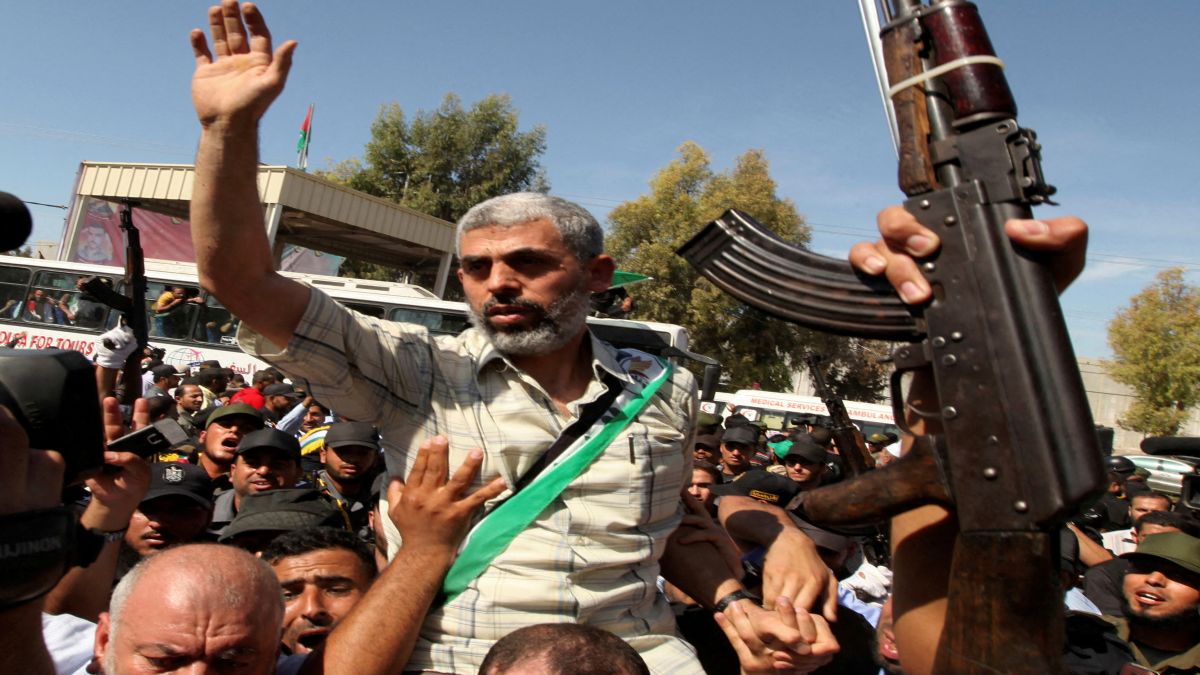Yahya Sinwar, 61, who led Hamas in Gaza since 2017, was killed during an Israeli Defense Force (IDF) raid in Rafah, Israel said on Thursday. His death, a result of a tank shell fired during a clash with Hamas forces, has left a leadership void within Hamas.
The question now is, who will step into this pivotal role?
Whoever takes over will greatly influence the future of Hamas and the ongoing conflict, shaping whether negotiations for peace emerge or if the violence continues unabated.
Sinwar had recently taken over as Hamas’ overall leader in July after the assassination of his predecessor, Ismail Haniyeh, in Iran. He was instrumental in pushing for continued aggression against Israel. His leadership was also behind the October 7 attacks, which killed over 1,200 people and left nearly 100 hostages in the hands of Hamas.
WATCH: From missing arm to staring contest with drone, the final moments of Yahya Sinwar
The next leader will significantly shape how the ongoing war with Israel unfolds, including decisions related to the fate of the hostages.
Who are the top contenders for Hamas leadership?
Mohammed Sinwar
A leading candidate is Mohammed Sinwar, Yahya’s younger brother, who is one of Hamas’ senior commanders in its military wing. At 49, Mohammed has remained largely out of the public eye but is deeply involved in the group’s operations.
He has survived multiple assassination attempts and is a top target for Israeli forces. While Mohammed may lack his brother’s charismatic leadership, his family ties and reputation within Hamas could make him a strong contender.
However, his appointment could signal a continued commitment to the hardline approach of Yahya, with experts speculating that Hamas may retaliate for Yahya’s death by escalating violence, including the possible execution of hostages.
Khalil Al-Hayya
Khalil Al-Hayya, who has served as Hamas’ top negotiator in indirect ceasefire talks with Israel, is seen as another possible successor. Al-Hayya, 63, was Yahya Sinwar’s deputy and played a significant role in diplomatic efforts.
Some experts suggest that if Al-Hayya rises to leadership, there could be a shift toward diplomacy. Earlier this year, Al-Hayya indicated that Hamas might consider disarming if Israel recognised a Palestinian state in Gaza and the West Bank.
However, this route toward diplomacy remains uncertain as many military leaders behind the October 7 attack have already been killed, leaving the political leaders to determine Hamas’ future course.
Khaled Meshaal
Another prominent figure in the running is Khaled Meshaal, 68, who previously led Hamas from 2004 to 2017. Meshaal, now based in Qatar, is considered by some as the heir apparent, especially given his international connections.
Meshaal was instrumental in earlier escalations of violence and has called for suicide bombings against Israelis. However, his base in Qatar could potentially be leveraged by international actors, including the White House, to push for negotiations.
The White House could up the ante and demand that Doha extradite one of the world’s most wanted terrorists as Meshaal’s involvement offers a diplomatic opportunity if external pressures are applied.
Hussam Badran
Hussam Badran, 58, is another potential successor, though seen as a less likely choice. As a prominent spokesman for Hamas, Badran is one of the few public figures still alive.
Who are other key figures within Hamas?
Mohammad Shabana
Mohammad Shabana, also known as Abu Anas Shabana, heads Hamas’ military operations in Rafah and has been deeply involved in the planning of Hamas’ tunnel networks. Shabana, 49, played a major role in developing these tunnels, which have been crucial in Hamas’ attacks against Israeli troops.
His leadership over the Rafah battalion since 2014, following the death of three top commanders has cemented his importance within Hamas’ military infrastructure.
Marwan Issa
Marwan Issa, another shadowy figure within Hamas, had been Yahya Sinwar’s deputy before the war. Known for his ability to avoid detection, Issa was reportedly killed by Israel in March 2023.
However, this death has not been confirmed by Hamas, leaving questions about his status. Issa, along with Yahya Sinwar and Mohammed Deif, who was killed in an Israeli airstrike in July 2023, formed Hamas’ strategic military council. His potential death further depletes the pool of experienced leaders within Hamas.
Rawhi Mushtaha
Another veteran Hamas leader, Rawhi Mushtaha, was Yahya Sinwar’s confidant and ally, instrumental in founding Hamas’ security apparatus in the 1980s.
However, Mushtaha’s fate remains unclear, with reports suggesting he may have been killed in a strike in Gaza earlier in the conflict.
Also Watch:
With many of Hamas’ top military leaders either dead or incapacitated, the selection of the next leader could determine whether this cycle of violence continues or if new efforts toward peace emerge.
Following news of Sinwar’s death, United States President Joe Biden and US Vice President Kamala Harris have said that this development ay set the stage for the return of hostages and an end to war in Gaza.
Also Read: How Israel tracked and killed its Enemy Number 1 Yahya Sinwar
With inputs from agencies


)

)
)
)
)
)
)
)
)



